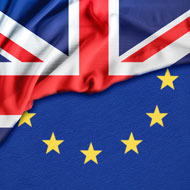Government responds to vets' Brexit concerns

"As the Minister’s letter flags, there are still many unknown-unknowns when it comes to Brexit."
Immigration minister Robert Goodwill MP has recognised the 'vital work' of UK and EU vets, but said the working rights of EU vets living in the UK can only be protected after Brexit if the rights of British citizens in EU member states are protected in return.
The position was stated in a letter to the BVA and RCVS, in response to concerns about how the UK's exit from the EU may impact the veterinary profession.
Around 50 per cent of the veterinary surgeons who register to practise in the UK each year are from overseas, primarily the EU.
In total there are more than 26,000 veterinary surgeons and 11,000 veterinary nurses in the UK who work to improve the health and welfare of animals, monitor and control the spread of diseases and assure food safety.
Mr Goodwill wrote: 'The Prime Minister has provided repeated reassurances that she wants to protect the working status of EU nationals already living in the UK, and the only circumstances in which that wouldn't be possible is if British citizens' rights in other EU Member States were not protected in return.'
The minister added that the government intends to reach an agreement on the status of EU nationals as soon as possible.
BVA president Gudrun Ravetz commented: "As the Minister’s letter flags, there are still many unknown-unknowns when it comes to Brexit, which is why it’s vital that we continue to gather vets’ views and work closely with the RCVS, amongst others, to ensure that the voice of the veterinary profession is heard in Brexit negotiations and discussions.
"It’s encouraging that the Minister’s letter not only acknowledges the vital role vets play in official terms, but through his personal note as well. BVA has been, and will continue to raise the profession’s most pressing issues to Ministers and MPs in every government across the UK to ensure that we secure the best possible outcomes for our profession and for animal health and welfare."
Those wishing to share their thoughts on the challenges and opportunities facing the profession can contact their regional BVA representative, who will raise their concerns at BVA Council on 7 December.



 The veterinary mental health charity Vetlife is inviting the veterinary community to join it for a sponsored cold-water dip.
The veterinary mental health charity Vetlife is inviting the veterinary community to join it for a sponsored cold-water dip.